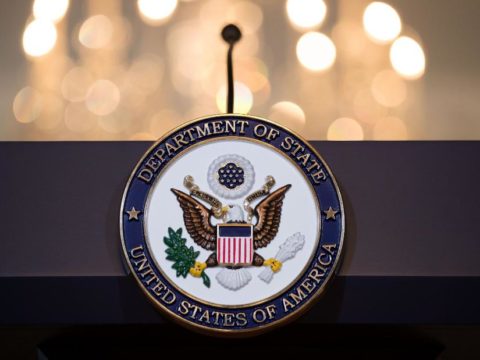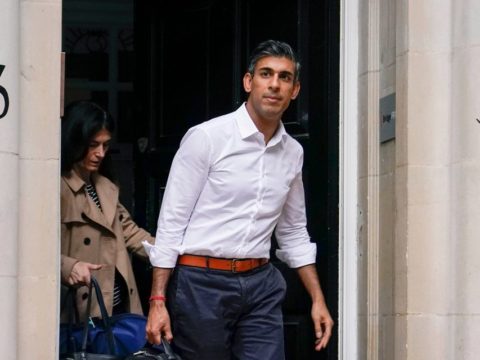Abdelaziz Bouteflika, the ailing Algerian president whose candidacy has spawned weeks of protests in his tightly controlled nation, announced Monday that he would not seek a fifth term in office.
The announcement was a concession to citizens who have turned out in ever-increasing numbers on the streets of Algeria’s cities to demand that Mr. Bouteflika give up plans to extend his 20-year rule.
But the same statement also canceled the election that had been scheduled for April, raising questions about how long the president would remain in power.
“There will be no fifth term,” a statement released to the official news agency in Mr. Bouteflika’s name said Monday night, adding, “and for me there has never been any question of it, my health and my age giving me only as my final duty to the Algerian people contributing to the founding of a new republic as the framework for a new Algerian system.”
In fact Mr. Bouteflika, or at least those around him, had maintained his candidacy until the announcement. The 82-year-old president of this oil-rich country was paralyzed in a 2013 stroke, has not been able to address his citizens since, and rarely appears in public.
Eight years after the Arab Spring forced out autocrats elsewhere in the region, it seemed to finally be Algeria’s turn: An autocrat had been forced to cede some power by the street. The demonstrations were largely peaceful, with violence neither from security forces nor the crowds.
On Monday night, hundreds of youths waving flags celebrated Mr. Bouteflika’s decision in Algiers. Cars honked horns and families poured out into the streets.
“It’s a very important moment, because power in Algeria has never backed down,” said Benjamin Stora, a leading historian of Algeria. “Two weeks ago, this was unimaginable.
“And then, there have been no deaths. It’s a great moment in the history of the Mediterranean Basin — a president who retreats, and nobody is killed. It’s really very important.”
But it was unclear whether the announcement would fully satisfy the protesters, or indeed how much ground Mr. Bouteflika had in fact given up.
The announcement suggested that, although the April 18 election was canceled and Mr. Bouteflika would no longer be a candidate, he still intended to hang on at least until a successor was chosen, in an election that so far has not been scheduled.
“I commit myself, if God grants me life and help,” he said, “to transmit the duties and prerogatives of the president of the republic to the successor that the Algerian people will have freely chosen.”
That escape clause quickly led some in the Algerian opposition to suspect that the wily president had maneuvered his way out of a tight spot, that a veteran politician who had survived more than a half century of regime changes in his troubled country had once again come out on top.
“Bouteflika is not running, but he’s going to remain as president beyond April 2019,” Abdelaziz Rahabi, a former communications minister, wrote on Facebook. “To arrogance, he adds contempt. His unhealthy obsession with power is a threat to the stability of the state and the unity of the nation.”
Even if Mr. Bouteflika did step down, there was no assurance that the small circle actually running the country — the army, the president’s brother, a few powerful industrial bosses who have received lucrative state contracts — would relinquish power.
“The decisions announced today are a partial victory for the people’s movement,” one of the country’s leading human rights lawyers, Moustapha Bouchachi, said in a video on Facebook. “But the demands of Algerians are not limited simply to a delay in the elections, and the dropping of a fifth term. What we’re talking about is a transition period, and a government of national consensus.”
The official statement on Monday also said that a convention would be called to write a new constitution, and that a new government would be formed.
But it gave no date for the convention or for new elections. And Mr. Bouteflika’s vow that he would “watch over all the constitutional institutions” suggested that he, or at least those around him, intended to keep a tight grip on essential functions for an unspecified period.
The statement gave a nod to the group that forced the government’s hand Monday: Algeria’s youth. “I especially understand the message of the young, anxious and ambitious over their own future and that of country,” it said.
But the announcement was unlikely to satisfy the youthful protesters once the initial euphoria wore off. Previous concessions by Mr. Bouteflika, including plans to set early elections should he win a new term in April, had also failed to temper public outrage.
“It’s a first victory,” said an Algerian political scientist, Lahouari Addi, an emeritus professor at the Institute of Political Studies in Lyon, France. “It’s a first concession. But the street will demand more. It’s a revolutionary situation.”
He said protesters would most likely demand that the army “stop designating the president and the government.”
The protests were the biggest in Algeria in at least three decades. Tens of thousands turned out Friday, and the demonstrations continued over the weekend, even as Mr. Bouteflika returned from hospital treatment in Geneva.
His paralysis was seen by demonstrators as a symbol of Algeria, a place where unemployment affects perhaps a quarter of the population, institutions are rubber stamps for the ruling elite, and hundreds of people a year attempt the dangerous crossing to Europe. Parliament is powerless, and although there are elements of a free press, journalists are regularly harassed.
The massive protests have already evoked comparisons to the demonstrations that toppled the longtime rulers of Tunisia and Egypt in early 2011 and set off the wave of uprisings across the region that became known as the Arab Spring.
Commentators in the region speculated on the potential impact of Mr. Bouteflika’s capitulation on Sudan, where months of street demonstrations have demanded the resignation of the longtime strongman, Omar al-Bashir, who is 75 years old and has ruled for 30 years.
Sudan, like Algeria, had largely escaped the upheaval in 2011, in part because the painful memories of earlier episodes of civil strife were still fresh. But unlike his Algerian counterpart, Mr. al-Bashir is struggling to quell demonstrations while the Sudanese economy is teetering on the brink of collapse.
The events in Algeria “may encourage the Sudanese people to stay the course and maintain their resilience, to try to push out Bashir,” Suliman Baldo, a Sudanese human rights advocate who is now in the United States, said in a telephone interview.
But he doubted the Algerian example would do much to dislodge Mr. Bashir from power, noting that the Algerian security forces had refrained from bloody confrontation with the demonstrators but the Sudanese have cracked down with increasing force since a declaration of emergency last month.
“If you see the way that the police and security forces behaved in Algeria it was really very responsible,” Mr. Baldo said. “In Sudan they were ferocious. They have not hesitated to use live ammunition and now, under the state of emergency, they have started walking into houses and beating people in their own homes. They are acting above the law.”
Other Arab rulers, too, have signaled that they were watching the Algerian protests with some trepidation. President Abdel Fattah el-Sisi of Egypt, who rose to power promising to restore order after the Egyptian uprising of 2011, has made little effort to hide his apprehension that the protests in Algeria and Sudan could inspire new unrest in Egypt.
Protesters around the region were “ruining” their countries, he told Egyptians in a televised speech Sunday, and warned that more demonstrations would damage the already-struggling economy. “How are tourism or factories or trade supposed to get off the ground? Should we eat, or should we say that we were busy protesting?”
Credit: Source link














